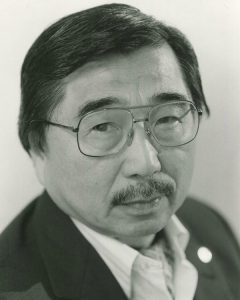 DR. GORDON KIYOSHI HIRABAYASHI was born in 1918 in Auburn, Washington. He was known for his courage and leadership in Canada and the U.S. in upholding human rights principles. In May 1942, Gordon Hirabayashi, a college student, a Quaker and pacifist deliberately violated the curfew imposed upon Japanese Americans and officially challenged the government order on the grounds that it violated his constitutional rights. He lost his appeal to the Supreme Court, serving 90 days in prison. In 1987 the courts reversed his conviction on the grounds that the curfew, internment and uprooting policies were based on political expediency, and not on any risk to national security. After the war, he completed his education, receiving B.A., M.A. and Ph.D degrees in sociology from the University of Washington. Dr. Hirabayshi, a Canadian citizen, resided in Edmonton and was Chair of the Sociology department at the University of Alberta from 1963-70 and retired in 1983.
DR. GORDON KIYOSHI HIRABAYASHI was born in 1918 in Auburn, Washington. He was known for his courage and leadership in Canada and the U.S. in upholding human rights principles. In May 1942, Gordon Hirabayashi, a college student, a Quaker and pacifist deliberately violated the curfew imposed upon Japanese Americans and officially challenged the government order on the grounds that it violated his constitutional rights. He lost his appeal to the Supreme Court, serving 90 days in prison. In 1987 the courts reversed his conviction on the grounds that the curfew, internment and uprooting policies were based on political expediency, and not on any risk to national security. After the war, he completed his education, receiving B.A., M.A. and Ph.D degrees in sociology from the University of Washington. Dr. Hirabayshi, a Canadian citizen, resided in Edmonton and was Chair of the Sociology department at the University of Alberta from 1963-70 and retired in 1983.
He was actively involved in the Edmonton Japanese Community Association and founded their newsletter, Moshi Moshi, to keep the community informed during the redress movement. He was a well-known and active member on the NAJC Council during the ‘80s. His historical perspective and strong belief in individual rights helped shape the NAJC redress principles and laid the ground work for future redress settlements such as the Chinese Head Tax, and the First Nation and Inuit residential school settlements. He received the NAJC National Award in 2003. Dr. Hirabayashi died on January 2, 2012.
Description of the Dr. Gordon Hirabayashi Human Rights Award:
The award may be presented every two years at the NAJC AGM, in recognition of an individual or organization in Canada contributing to the development or promotion of human rights and equality in Canada.
Eligibility:
• The individual or group must be committed to the ideal, as stated in the mission statement of the NAJC, “to strive for equal rights and liberties for all people, particularly racial and ethnic minorities”.
• Individuals or groups must live/operate in Canada
• The award will not be given posthumously nor to an organization that is no longer active.
• The person may or may not be of Japanese ancestry or a member of NAJC., but supportive of its mandate.
Selection process:
Nominations will be accepted by email, together with the following documents in a single submission:
• A letter from the nominator (including address, phone number and email) describing the nominee, their volunteer or paid work and accomplishments, as well as why the nominee merits the award.
• A curriculum vitae or detailed biography or a profile of the nominee.
• Any additional supporting documentation such as articles written by or about the nominee, print materials, internet links or other information.
• At least two references (including addresses, phone numbers, and email addresses), who have in-depth knowledge of the nominee’s work and activities, and who may be contacted by jury members to obtain
more detailed information.
• A jury of 3 people composed of the Chair of the Human Rights Committee, plus two others selected by the NEB, will review all nominations and make the selection.
• Deadline for nominations is July 31, 2022 and providing there is a suitable candidate, the award will be presented at the 2022 AGM.
Nominations are to be sent to the attention of the Chair, NAJC Human Rights Committee by email to: national@najc.ca with a copy to: humanrights@najc.ca
2021: Shin Imai
2018: Kay Shimizu
2014: Terry Watada
2012: Tatsuo Kage
Dr Gordon Hirabayashi Graduate Scholarship in Sociology
Donor information
Endowed by supporters of the Department of Sociology, University of Alberta in honor of Dr Gordon Hirabayashi (1918-), who was the first Chairperson of the University of Alberta's Department of Sociology. During his years as department head, he led his colleagues in building one of Canada's leading Sociology departments. Dr Hirabayashi's North America-wide reputation as a defender of minority group rights is based on his principled resistance to the internment of Japanese Americans during World War II when he forced a United States Supreme Court ruling that led to his own imprisonment. Four decades later, in 1987, the ruling was overturned.
Award Value
Variable
Nomination Deadline
October 1
Eligibility Criteria
Awarded annually to a student registered full-time in a graduate degree program in the Department of Sociology at the University of Alberta with research interests in one or more of the following areas: human rights, race and ethnic relations, social inequality, or social justice. The recipients will be selected on the basis of superior academic achievement (equivalent to a grade point average of 3.5 or greater on the University of Alberta grading scale).
Application Process
Application forms are available in the graduate student office in the Department of Sociology, 5-21 Tory, University of Alberta. Eligible students should submit their application to the department.
